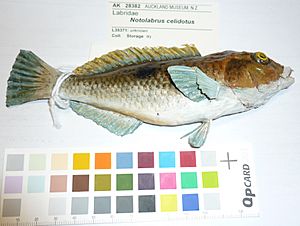Spotty (fish) facts for kids
Quick facts for kids Spotty |
|
|---|---|
 |
|
| Conservation status | |
| Scientific classification |
|
| Kingdom: | Animalia |
| Phylum: | Chordata |
| Class: | Actinopterygii |
| Order: | Labriformes |
| Family: | Labridae |
| Genus: | Notolabrus |
| Species: |
N. celidotus
|
| Binomial name | |
| Notolabrus celidotus (Bloch & J. G. Schneider, 1801)
|
|
| Script error: The function "autoWithCaption" does not exist. | |
| Synonyms | |
|
|
Script error: No such module "Check for conflicting parameters".
The spotty fish, also known by its scientific name Notolabrus celidotus, is a special type of wrasse. It lives only in the waters around New Zealand, including places like Stewart Island.
You can find spotties on reefs in the ocean. They usually live in water that is about 22 to 145 meters (72 to 476 feet) deep. They are most often seen in the shallower parts of this range. These fish can grow up to about 23.9 centimeters (9.4 inches) long.
Contents
About the Spotty Fish
Spotties are fascinating fish because of how they live and grow. They are a common sight in the waters where they live. These fish are an important part of the ocean's ecosystem.
Life Cycle and Reproduction
Spotty fish have a very interesting way of growing up. All spotties start their lives as females. This means that when they are born, they are always girls!
As they get older, some of the largest female spotties can change into males. This usually happens when they are about 3 to 4 years old. At this age, they are typically 13 to 19 centimeters (5 to 7.5 inches) long.
Social Life of Spotties
Male spotties are very protective of their space. They choose an area in the reef and defend it from other males. In this territory, a male spotty will have a group of about 20 females. This group is called a harem.
If a male spotty dies, the most powerful female in his harem will take over. She will change her sex from female to male in just a few days! Then, she will become the new leader of the harem and the territory. This unique social system means there are always many more female spotties than males.
When Spotties Lay Eggs
Spotty fish usually lay their eggs, a process called spawning, from late July to the end of October. This is when new baby spotties begin their journey.
See also
 In Spanish: Notolabrus celidotus para niños
In Spanish: Notolabrus celidotus para niños
 | John T. Biggers |
 | Thomas Blackshear |
 | Mark Bradford |
 | Beverly Buchanan |


